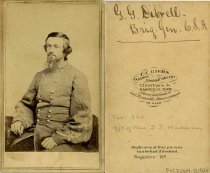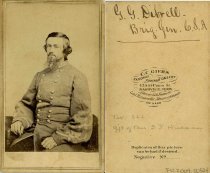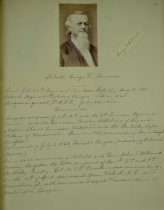Person Record
Images

Metadata
Name |
Dibrell, George Gibbs |
Born |
4/12/1822 |
Birthplace |
Sparta, White County, Tennessee |
Places of residence |
Sparta, Tennessee |
Father |
Anthony Dibrell |
Mother |
Mildred Carter |
Nationality |
United States of America |
Education |
Local country schools East Tennessee University |
Notes |
George Gibbs Dibrell, by Mary Nan Crowther (28 Nov 1997) George Dibrell was also a leading citizen of Tennessee. He was a General in the Civil War and was very active just prior to the war, during the war, and for about twenty years following. When the war began George was found to be on the Southern side. East Tennessee did not present an unboken front at that time and had many political complications as the leaders were divided. Andrew Johnson and Thomas R. R. Nelson, two of the most prominent men of the day, opposed secession bitterly. Johnson had been governor of the State, and was then in the senate of the United States. Nelson, a great lawyer of his time, while he did not hold an office, swayed a powerful influence. There were other elements preaching a mixture of politics and religion. These were William G. Brownlow, editor of the Knoxville Whig, and a Methodist preacher who swayed the riff-raff of East Tennessee illiteracy and preached to the mountain element from Chattanooga to Bristol and from the North Carolina to the Kentucky line espousing the Federal cause. There were, however, many who regardless of financial interest or personal safety chose to fight under the Southern flag, among whom was George Dibrell. Raising a regiment of cavalry from among the yeomanry of the Cumberland mountains, after having served some time as a private, he offered their services to the Confederate government, and pitching, as it were, into the thickest of the fight, he rose steadily by promotion until he was made brigadier-general of cavalry. His command played a conspicuous part in many of the active engagements of the war, and when at last the failure of the Confederacy was seen, it fell to their part to act as a body guard of the Confederate government when Richmond was evacuated. After the war the consequences which followed the war as a result of contending political factions and deep-seated difference of opinion in regard to secession, fortold unhappy circumstances for those who had supported the South. Brownlow was made military governor, and the Confederate soldier who dared to go back home when the war ended, took his life in his own hands. The fighting actually continued in East Tennessee for two years after the war was over. Feelings ran high. The courts consisted of South-haters, and the juries were made up from among the ignorance of the mountains, so that it was next to impossible to obtain the conviction of any one charged with committing an outrage against an ex-Confederate. If one should slip through, the governor, Brownlow, would give a pardon. All of this presented George Dibrell with a calling. He and others would have to help rescue that section from the grasp of what was no less than a lawless element. East Tennessee was composed of three congressional districts, all of which were solidly Republican and solidly lawless in their tendencies, while the remainder of the State, though differing very much, was virtually under the heel of the lawless element. It would be necessary to break this power. Though following the war he once again became engaged in farming and mercantile pursuits, General George Dibrell proved himself equal to the emergency and broke the backbone of the Republican Party in the Third district of Tennessee. He became the stand-bearer of the Democratic party in the congressional race of 1874 and led the party to victory and would be elected to Congress for five successive terms. He voluntarily retired from politics and four years later passed away on May 9, 1888. At the time of his death his name was being mentioned as a candidate to run for governor. He died at his home in Sparta. George Gibbs Dibrell George Gibbs Dibrell was born in White county, Tennessee, April 12, 1822, the son of Anthony and Mildred (Carter) Dibrell. The Dibrells are of Huguenot descent. George Dibrell attended the country schools in the winter and worked in the summer. In the spring of 1838 he attended the state university at Knoxville for one term. In 1839 he began trading on his own account. He was elected clerk of the Sparta branch of the Bank of Tennessee in 1840, which position he held until March, 1846. From this time until 1860 he was in mercantile life at Sparta and again from 1865 to 1875, being successful in his business affairs. He was elected to the state legislature in 1861, but after having served a few weeks decided to join the army. He entered the Confederate service July 20, 1861, as a private in the Twenty-fifth Tennessee Infantry. On August 10, 1861, he became lieutenant-colonel. He served under General Zollicoffer in Tennessee and Kentucky and was in the battle of Fishing Creek, January 19, 1862, and in the battle of Farmington, Mississippi, May 7, 1862. He afterwards raised the Eighth Tennessee Cavalry, of which he became colonel and went with it into Forrest's command at Murfreesboro. His service extended over Kentucky, Tennessee, Mississippi, Alabama, Georgia, South Carolina, North Carolina and Virginia. He succeeded to the command of General Forrest's "old brigade" on July 1, 1863, and was commissioned brigadier general in July, 1864. He was in most of Forrest's brilliant campaigns and was one of his most trusted commanders. In August, 1864, he commanded under Wheeler in his raid into Middle Tennessee. After the capture of Richmond, General Dibrell escorted President Davis to Washington, Georgia, where the command was surrendered. In 1870, he was a member of the constitutional convention. Up to the war he was a Whig and after the war, a Democrat. He was elected to the lower house of congress in 1874, of which body he remained a member by consecutive reelections until 1885 when he declined reelection. His career in congress was remarkable for the many useful bills which he introduced and succeeded in having passed. After his retirement he engaged in farming and stock raising on his farm near Sparta until his death in 1888. On January 13, 1842, he had married, at Sparta, Miss Mary E. Leftwich, daughter of Waman Leftwich. [Tennessee the Volunteer State 1769-1923: Volume 1, pp. 111-112]. |
Occupation |
Banking Law U.S. Congressman |
Role |
Military |
Spouse |
Mary E. Leftwich |


